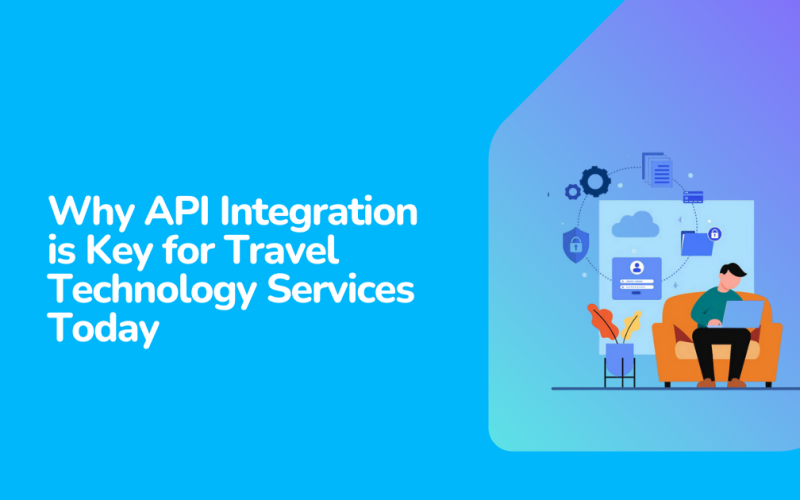The travel industry has undergone a massive transformation with the advancement of digital technology. Travel Technology Services have become an essential part of modern travel businesses, enabling seamless operations and enhanced customer experiences. Among the many innovations, API (Application Programming Interface) integration has emerged as a game-changer, allowing businesses to connect different systems, automate workflows, and provide real-time data access. In the digital era, API integration is crucial for travel technology services to remain competitive and efficient.
- Over 80% of travel bookings are made online, with API integrations enabling seamless transactions.
- API-driven automation has reduced travel booking time by up to 60%.
- More than 70% of travel companies use API integrations for customer experience enhancements.
Understanding API Integration in Travel Technology Services
API integration enables different software applications to communicate and exchange data in real-time. In the travel industry, APIs serve as digital bridges, connecting various services such as flight booking systems, hotel reservations, car rentals, and payment gateways. This seamless connectivity allows travel businesses to aggregate information from multiple providers, delivering a unified and efficient user experience.
By integrating APIs, travel companies can offer a broad spectrum of services without developing complex backend infrastructure from scratch. This not only reduces operational costs but also enhances customer satisfaction by providing real-time availability, pricing, and booking confirmations across multiple platforms.
The Role of API Integration in the Travel Industry
API integration is a fundamental component of modern travel technology services, enabling seamless communication between various platforms and service providers. It enhances efficiency, improves customer experiences, and streamlines operations. The key roles of API integration in the travel industry include:
- Automation of Booking Processes – Reduces manual efforts by automating flight, hotel, and car rental bookings, improving operational efficiency.
- Real-Time Data Exchange – Ensures that travelers and businesses receive up-to-date information on availability, pricing, and cancellations for flights, hotels, and other services.
- Customization and Personalization – Helps travel companies offer tailored recommendations based on user preferences, past bookings, and real-time data.
- Seamless Connectivity – Links different travel platforms, including airlines, hotels, tour operators, and payment gateways, to deliver a unified and hassle-free booking experience.
Key Benefits of API Integration for Travel Technology Services
API integration is transforming the travel industry by enabling businesses to streamline operations, enhance customer experiences, and scale efficiently. Here are the key benefits of integrating APIs in Travel Technology Services:
1. Enhanced Data Synchronization
- APIs ensure real-time synchronization between airlines, hotels, car rental services, and other travel providers.
- Customers receive accurate and updated information on pricing, availability, and itinerary changes, reducing errors and miscommunication.
2. Improved Customer Experience
- With seamless connectivity, travelers can access flight and hotel options in one place, eliminating the need to visit multiple websites.
- API integration enables personalized recommendations, automated bookings, and hassle-free cancellations, enhancing user satisfaction.
3. Cost and Time Efficiency
- Instead of building complex booking systems from scratch, businesses can integrate third-party travel APIs, reducing development costs and time.
- Automation minimizes manual data entry and operational overhead, increasing efficiency.
3. Scalability and Flexibility
- Travel businesses can expand their offerings by adding new API connections for flights, hotels, car rentals, and additional services.
- APIs enable companies to adapt to market demands without major infrastructure changes, ensuring long-term scalability.
4. Competitive Advantage
- Businesses leveraging API-driven innovation can provide advanced travel solutions, such as AI-powered trip planning and real-time booking updates.
- By offering a seamless and intuitive travel experience, companies can differentiate themselves from competitors and build stronger customer loyalty.
API integration empowers travel businesses with automation, accuracy, and agility, making it an essential component of modern Travel Technology Services.
Types of Travel APIs and Their Functions
API integration is essential in Travel Technology Services, enabling seamless interactions between travel providers and customers. Here are the key types of travel APIs and their functions:
1. Flight Booking APIs
- Connect airlines with travel agencies, OTAs (Online Travel Agencies), and booking platforms.
- Provide real-time flight schedules, seat availability, fare comparisons, and booking confirmations.
- Ensure seamless ticketing, cancellations, and rescheduling.
2. Hotel Booking APIs
- Enable seamless hotel reservations across multiple platforms.
- Display real-time room availability, pricing, amenities, and customer reviews to help users make informed decisions.
- Support instant booking, modifications, and cancellations.
3. Car Rental APIs
- Allow travelers to book rental vehicles from various providers.
- Offer real-time pricing, availability, and location-based car rental services.
- Integrate with fleet management systems for improved logistics and tracking.
4. Payment Gateway APIs
- Facilitate secure and encrypted online transactions.
- Support multiple payment methods, including credit/debit cards, e-wallets, and cryptocurrencies.
- Ensure compliance with financial security standards (PCI DSS).
5. Weather and Location APIs
- Provide real-time weather updates to help travelers plan trips effectively.
- Offer location-based recommendations, including nearby attractions, hotels, and restaurants.
- Enhance GPS navigation and travel route planning.
By integrating these APIs, travel businesses can enhance operational efficiency, improve customer experience, and expand their service offerings without investing in complex infrastructure.
How API Integration is Transforming Travel Technology Services
API integration has revolutionized Travel Technology Services by enabling businesses to operate more efficiently, automate processes, and enhance customer experiences. By connecting various travel services through APIs, companies can provide end-to-end solutions without the need for developing complex infrastructure from scratch.
Key Ways API Integration is Transforming the Travel Industry
- Seamless Booking and Reservation Management
- APIs enable real-time synchronization between travel agencies, airlines, hotels, and rental services.
- Travelers can book flights, hotels, and transportation from a single platform, eliminating the need for multiple bookings.
- Automation of Travel Processes
- Manual booking processes are replaced with automated workflows, reducing errors and increasing operational efficiency.
- APIs ensure instant confirmations, modifications, and cancellations without human intervention.
- Personalized Travel Experiences
- AI-powered APIs analyze customer preferences, past bookings, and behavior to offer customized travel recommendations.
- APIs enable dynamic pricing, ensuring travelers receive the best deals based on their preferences.
- Global Connectivity with Multiple Travel Suppliers
- Travel APIs connect businesses with global travel suppliers, airlines, and hotel chains, expanding their service offerings.
- This reduces dependency on a single provider and allows for competitive pricing.
- Faster and Secure Payment Processing
- Payment gateway APIs facilitate fast and secure transactions with multiple payment options.
- APIs ensure compliance with financial security regulations, preventing fraud and unauthorized transactions.
- Real-Time Travel Updates and Notifications
- API integration provides real-time flight status, hotel availability, and weather updates, improving traveler convenience.
- Automated notifications reduce last-minute surprises by keeping travelers informed about schedule changes.
- Enhanced Travel Itineraries and Multi-Modal Booking
- APIs allow businesses to offer comprehensive travel itineraries by integrating flights, accommodations, and local transport into one platform.
- Multi-modal booking APIs help travelers plan seamless journeys across air, rail, and road transport.
Challenges of API Integration in Travel Technology Services
While API integration brings significant advantages to Travel Technology Services, it also comes with several challenges that businesses must address to ensure seamless operations.
1. Data Security and Compliance
- Ensuring secure data transmission is a major concern, as travel APIs handle sensitive customer information, including payment details and personal data.
- Businesses must comply with industry regulations such as GDPR (General Data Protection Regulation), PCI DSS (Payment Card Industry Data Security Standard), and IATA (International Air Transport Association) security protocols.
- Failure to implement proper encryption and authentication can lead to data breaches and financial losses.
2. System Downtime and Reliability
- Travel businesses rely on APIs for real-time bookings and transactions, making API uptime critical.
- If an API experiences downtime or latency issues, it can disrupt services, leading to failed transactions, booking errors, and customer dissatisfaction.
- Implementing API monitoring tools and backup systems is necessary to maintain service reliability.
3. Managing Multiple APIs
- Travel platforms often integrate multiple APIs from different providers (airlines, hotels, car rentals, payment gateways), making management complex.
- Inconsistent data formats and response structures can create integration challenges.
- Businesses need robust API management solutions, such as API gateways and middleware, to ensure smooth integration and maintenance.
4. Cost of Implementation
- While API integration reduces long-term operational costs, the initial setup and development expenses can be high.
- Businesses must invest in API development, testing, security measures, and infrastructure upgrades.
- Frequent API updates and maintenance add to the overall cost, requiring dedicated resources.
Best Practices for Successful API Integration
Successful API integration in Travel Technology Services requires careful planning, monitoring, and continuous improvement. Following best practices ensures that the integration process is smooth, secure, and efficient, ultimately enhancing the overall user experience.
1. Choosing the Right API Provider
- Documentation and Support: Ensure the API provider offers comprehensive documentation, including clear usage guidelines, error handling instructions, and examples. This helps simplify the integration process and reduces potential issues.
- Scalability: Select APIs that are scalable to accommodate increased traffic and evolving business needs. Ensure that the API can handle high volumes of requests, especially during peak travel seasons.
- Reliability: The API provider should have a proven track record of uptime and reliability. Check for Service Level Agreements (SLAs) that guarantee a high level of availability to prevent system downtimes.
2. Ensuring Data Security
- Encryption: Implement end-to-end encryption (e.g., SSL/TLS) to protect sensitive customer data during transmission. This ensures that data remains confidential and cannot be intercepted by malicious parties.
- Authentication and Authorization: Use strong authentication mechanisms, such as OAuth or API keys, to ensure that only authorized users and systems can access the API. Implement role-based access controls (RBAC) to restrict access based on user roles.
- Compliance: Ensure the API integration complies with relevant security standards and data protection regulations (e.g., GDPR, PCI DSS). Regular audits and reviews of security protocols are essential.
3. Regular API Updates and Maintenance
- Version Control: Regularly update APIs to align with new technologies, security patches, and performance improvements. Ensure that versioning is handled properly to avoid disruptions.
- Deprecation Management: Inform users about deprecating older API versions well in advance to allow for a smooth transition to updated versions.
- Security Patches: Stay up to date with the latest security patches to prevent vulnerabilities from being exploited, particularly in high-risk areas such as payment processing or user authentication.
4. Testing and Monitoring
- Pre-Integration Testing: Before integrating the API into your system, conduct thorough testing in a sandbox environment to ensure compatibility and identify potential issues.
- Ongoing Monitoring: Continuously monitor the performance of APIs with tools like API gateways and dashboards to track response times, error rates, and transaction volumes. Set up alerts for critical performance metrics to address any issues promptly.
- Error Handling: Implement robust error-handling strategies to manage unexpected responses, ensuring minimal disruption to users and business operations. Use logging and reporting tools to track errors and troubleshoot effectively.
Future of API Integration in Travel Technology Services
The future of API integration in Travel Technology Services is set to revolutionize the industry with advancements in AI, machine learning, and blockchain. These technologies will enhance API capabilities, making travel experiences more personalized, secure, and efficient.
Key Trends Shaping the Future of API Integration in Travel
- AI-Driven Personalization
- AI-powered APIs will analyze traveler behavior, preferences, and past bookings to offer hyper-personalized recommendations.
- Chatbots and virtual assistants will use AI-driven APIs to provide real-time travel assistance.
- Blockchain for Secure Transactions
- Blockchain-based APIs will enhance payment security, fraud prevention, and data transparency.
- Smart contracts will streamline hotel and flight bookings, ensuring automatic refunds and dispute resolution.
- Voice and IoT-Enabled Travel Services
- Voice-enabled APIs will allow travelers to book flights, hotels, and car rentals using voice commands via smart devices.
- IoT-integrated APIs will connect with smart hotel rooms, providing automated room controls, check-ins, and personalized experiences.
- Seamless Multi-Modal Travel Integration
- APIs will integrate flights, trains, buses, and ride-sharing services, offering end-to-end travel planning through a single interface.
- This will enable real-time ticket availability, dynamic pricing, and route optimization.
- Enhanced Data Security and Privacy Compliance
- With rising concerns over data breaches, future APIs will adopt advanced encryption protocols and GDPR-compliant security measures.
- APIs will provide secure authentication mechanisms, such as biometric verification for travelers.
Conclusion
API integration is a fundamental component of travel technology services, driving efficiency, enhancing user experience, and enabling businesses to offer comprehensive travel solutions. In the digital era, embracing API-driven innovation is essential for staying competitive and meeting evolving customer demands.
FAQs
1. Why is API integration important for travel businesses?
API integration allows travel businesses to connect with various service providers, automate processes, and enhance user experiences efficiently.
2. How does API integration improve customer satisfaction?
By providing real-time data, seamless booking processes, and personalized services, API integration enhances customer satisfaction.
3. What are the risks of API integration in travel technology?
Security vulnerabilities, system downtime, and integration complexities are some challenges businesses may face.
4. How can businesses choose the right travel API?
Businesses should evaluate API providers based on reliability, scalability, documentation, and security features before integration.
5. What is the future of API integration in travel technology?
Future advancements in AI, machine learning, and blockchain will further enhance API functionalities, making travel technology more efficient and personalized.












